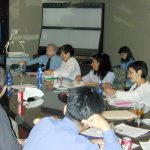Who is your Breast Center advocate?
When we began our comprehensive breast service in 1996, we had a lot to learn and create as the new center took wing. Fortunately, our physician team was open to guidance from a variety of sources. Early in our evolution as a center, we attended the annual conferences of the National Consortium of Breast Centers (NCBC). These meetings featured all-star-professionals in breast care from across the country. If you want to learn from the experts in all breast care disciplines, NCBC is the annual meeting to attend.
As we quickly learned, creating a comprehensive breast center takes a lot of effort from many people, and not just physicians. Everyone has to become a believer in the mission to deliver superior service and care to women with breast problems and disease. This commitment involves breast center personnel, pathology personnel, department of surgery staff, and hospital administration. This commitment must cross departmental boundaries to be effective. In fact, the more the boundaries disappear, the better. A smooth breast center operation needs various departments to function as if they were one department, dedicated to accurate, quick and compassionate care for these patients.
Why does a breast center need an advocate? It is simple: with all of the different people involved in breast center activities, there is a real need for someone who understands the comprehensive goals of care delivery and importantly, can make decisions that positively affect the program. In our case, this was an energetic and enthusiastic administrator, Juan Fresquez, MBA. He was always there to support physician and employee efforts in raising the bar for the women who came to our hospital for breast evaluation and care.
One time our breast team was sitting in a national conference conducted by famed mammographer, Dr. Laszlo Tabar, who was expounding on a particular approach to breast pathology and how to make it correlate to mammography. As the presentation concluded, this administrator advocate tapped my shoulder and asked: “don’t we need one of those devices?” For this old pathologist, that offer, then and now, represents the highest degree of advocacy for a program. Basically, this advocating administrator believed so much in what we were doing as a team that he was offering to purchase an expensive instrument for our program.

This kind of advocacy is very positive for a program, and very much appreciated by all members of the breast team. And quite honestly, we need more of it today.



